中国传统文化 英文版
- 格式:pptx
- 大小:5.11 MB
- 文档页数:22
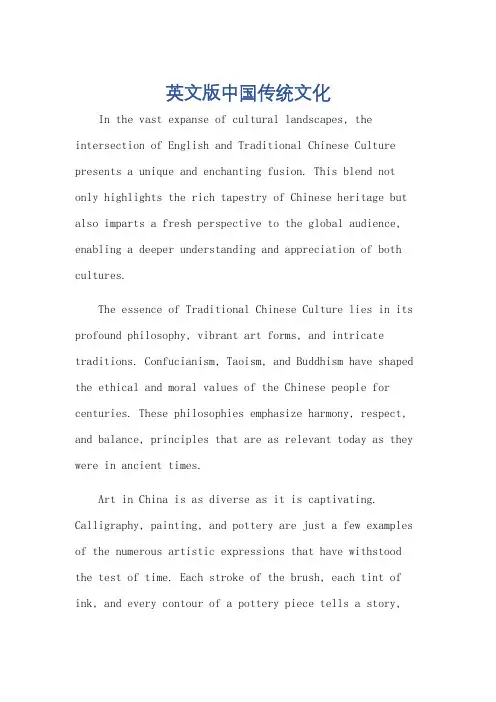
英文版中国传统文化In the vast expanse of cultural landscapes, the intersection of English and Traditional Chinese Culture presents a unique and enchanting fusion. This blend not only highlights the rich tapestry of Chinese heritage but also imparts a fresh perspective to the global audience, enabling a deeper understanding and appreciation of both cultures.The essence of Traditional Chinese Culture lies in its profound philosophy, vibrant art forms, and intricate traditions. Confucianism, Taoism, and Buddhism have shaped the ethical and moral values of the Chinese people for centuries. These philosophies emphasize harmony, respect, and balance, principles that are as relevant today as they were in ancient times.Art in China is as diverse as it is captivating. Calligraphy, painting, and pottery are just a few examples of the numerous artistic expressions that have withstood the test of time. Each stroke of the brush, each tint of ink, and every contour of a pottery piece tells a story,reflecting the artist's thoughts, emotions, and thecultural ethos of their era.Festivals and traditions are another vibrant aspect of Chinese culture. The Lunar New Year, Mid-Autumn Festival, and the Dragon Dance are celebrations that bring joy and unity to families and communities. These traditions are not just rituals but also a way of life, passed down through generations, connecting people to their ancestors and to the land.When Traditional Chinese Culture meets English, it opens up a world of possibilities. English, as a global language, provides a platform for the world to discover the richness of Chinese heritage. Through translations and interpretations, the depth and complexity of Chineseculture are made accessible to a wider audience.In this fusion, we see how English words and phrases are creatively adapted to capture the essence of Chinese traditions. For instance, the term "Confucius sayings" or "Taoist philosophy" are used to introduce Westerners to the wisdom of ancient Chinese thinkers. These translations notonly convey the meaning but also retain the cultural authenticity of the original.Moreover, English has also borrowed many elements from Chinese culture, enriching its vocabulary and expression. Words like "tea," "silk," and "paper" have become synonymous with Chinese culture, reflecting the influenceof China on global history and trade.In conclusion, the enchanting fusion of English and Traditional Chinese Culture is a testament to the power of cultural exchange and understanding. It bridges the gaps between East and West, allowing for a deeper appreciationof both cultures. As we continue to explore and embracethis fusion, we are reminded of the beauty and diversitythat can arise when different cultures come together in harmony.**东西方文化的魅力融合——英文版中国传统文化** 在丰富多彩的文化景观中,英语与中国传统文化的交融展现出独特而迷人的魅力。
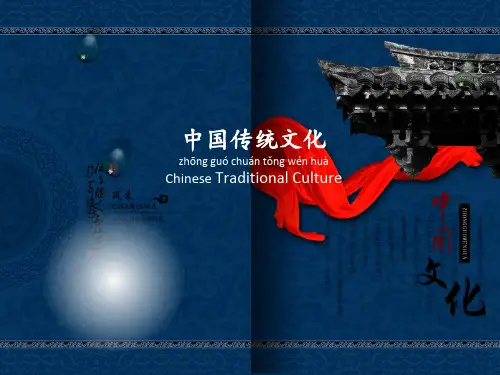
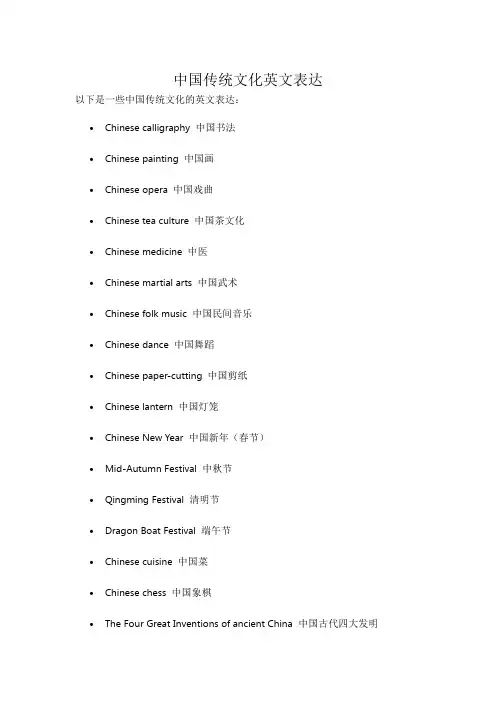
中国传统文化英文表达
以下是一些中国传统文化的英文表达:
•Chinese calligraphy 中国书法
•Chinese painting 中国画
•Chinese opera 中国戏曲
•Chinese tea culture 中国茶文化
•Chinese medicine 中医
•Chinese martial arts 中国武术
•Chinese folk music 中国民间音乐
•Chinese dance 中国舞蹈
•Chinese paper-cutting 中国剪纸
•Chinese lantern 中国灯笼
•Chinese New Year 中国新年(春节)
•Mid-Autumn Festival 中秋节
•Qingming Festival 清明节
•Dragon Boat Festival 端午节
•Chinese cuisine 中国菜
•Chinese chess 中国象棋
•The Four Great Inventions of ancient China 中国古代四大发明
这些只是中国传统文化的一部分,还有很多其他方面的文化元素,如传统服饰、建筑、文学、哲学等。
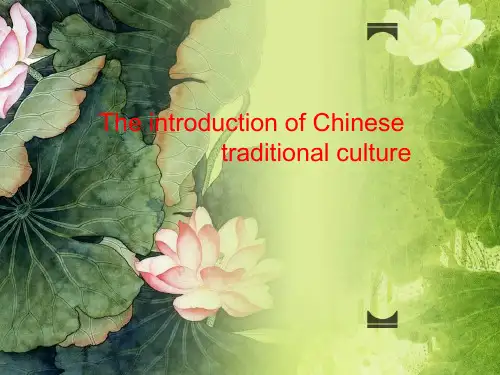
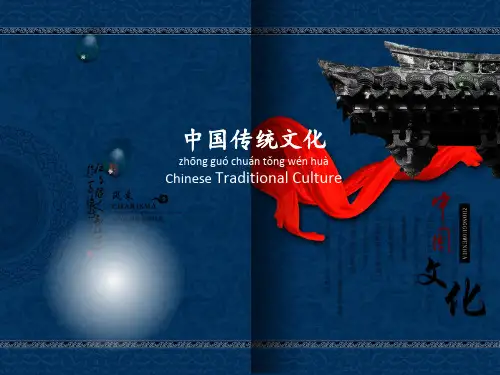
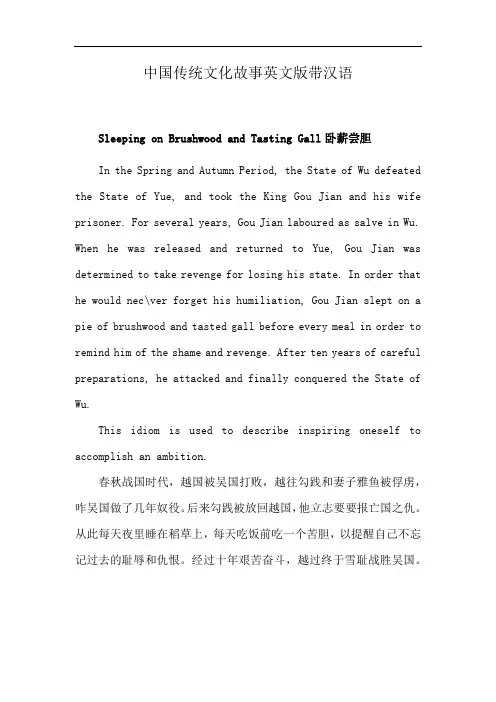
中国传统文化故事英文版带汉语Sleeping on Brushwood and Tasting Gall卧薪尝胆In the Spring and Autumn Period, the State of Wu defeated the State of Yue, and took the King Gou Jian and his wife prisoner. For several years, Gou Jian laboured as salve in Wu. When he was released and returned to Yue, Gou Jian was determined to take revenge for losing his state. In order that he would nec\ver forget his humiliation, Gou Jian slept on a pie of brushwood and tasted gall before every meal in order to remind him of the shame and revenge. After ten years of careful preparations, he attacked and finally conquered the State of Wu.This idiom is used to describe inspiring oneself to accomplish an ambition.春秋战国时代,越国被吴国打败,越往勾践和妻子雅鱼被俘虏,咋吴国做了几年奴役。
后来勾践被放回越国,他立志要要报亡国之仇。
从此每天夜里睡在稻草上,每天吃饭前吃一个苦胆,以提醒自己不忘记过去的耻辱和仇恨。
经过十年艰苦奋斗,越过终于雪耻战胜吴国。
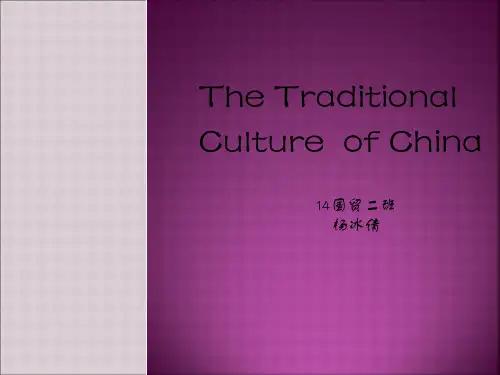
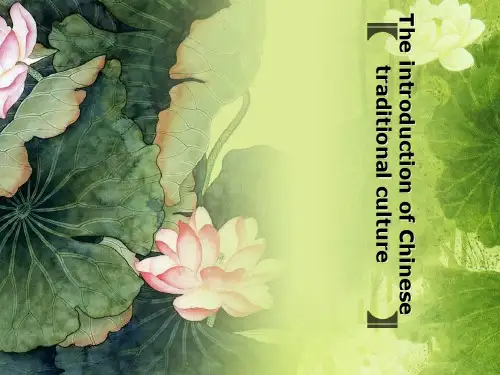
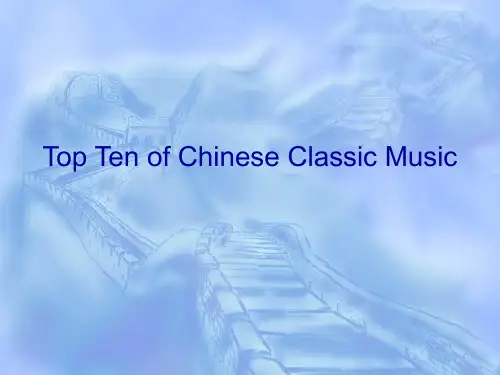
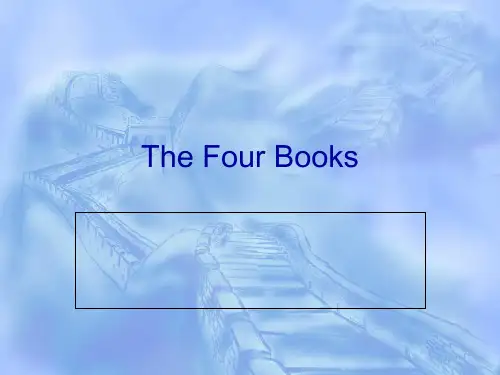
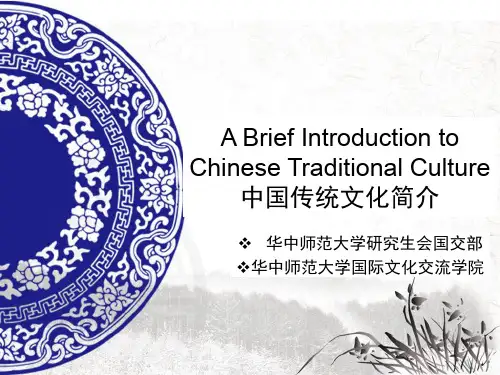
中国传统文化一、“传统节日”单词预热vocabulary work烹调cooking cuisine 鱼肉满架well stocked with fish and meat象征意义symbolic significance 农历lunar calendar阳历solar calendar 端午节Dragon Boat Festival元宵节Lantern Festival 清明节Pure Brightness Day重阳节Double Ninth Day 放逐be exiled忠臣loyal minister 糯米粽子glutinous rice dumplings wrapped in bamboo leaves祭祀亡灵in memory of sb. 龙舟比赛dragon boat races中秋节Mid Autumn Festival 满月full moon月饼moon cake 蜜饯preserved fruits豆沙bean paste 蛋黄egg yolk海鲜seafood 家禽poultry饺子dumplings 八宝饭eight treasure rice米羹rice balls 油条fried sticks麻花fried twisted stick 炒面Chaomian叉烧包steamed bun with roast pork 粥porridge芋头taro 葱油饼pan-fried cake with sesame seeds and green onion有关春节的常用词放鞭炮let off firecrackers 耍龙灯play the dragon lantern耍狮子play the lion dance 拜年pay a new-year call二、有关“介绍”的翻译•我很高兴向各位介绍中国的主要传统节日。
→I am very happy to have the opportunity to talk to you about major traditional Chinese holidays.表示“介绍情况”时,我们可以这样翻译:1.to share with you brief information•在此,我愿意向朋友们介绍这些方面的情况。